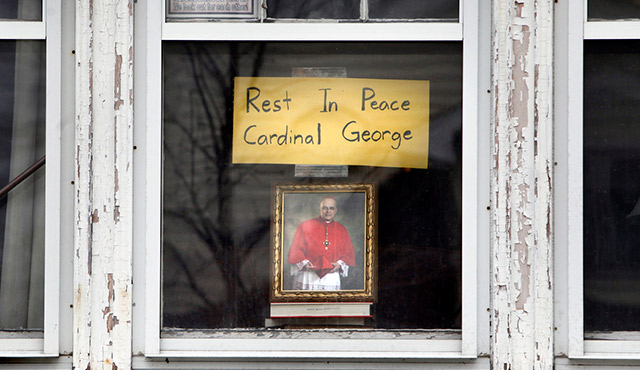When the death of Francis Cardinal George was announced, I spent time reflecting on his life and ministry. I met him many years ago when I was on a trip to Rome and he was the Bishop of Yakima at the time. We were seated across the aisle from one another on the flight to Rome, and he said simply “Hello, I am Francis George.”
In the years that followed I was fortunate to learn about his life and ministry, especially all of his years as Vicar General of the Oblates of Mary Immaculate. When he was appointed the Archbishop of Chicago, I got to know him better through my involvement as a judge in the Metropolitan Court of Appeal in the archdiocese, as I made many trips to Chicago for that important work and ministry. As a priest of the Diocese of Springfield in Illinois he would have been the Metropolitan Archbishop for the Province of Illinois, where Springfield is included.
After I was appointed the Bishop of Fort Worth, Texas, we began to see each other more often, and he was always interested in, and supportive of my life and ministry in Fort Worth. He knew Texas and the Province of San Antonio because of the presence of the Oblate Fathers in Texas. His leadership of the U.S. Bishops Conference reflected his intellect, his faith and his humor. On more than one occasion, his incisive comments were able to help focus the seemingly endless debates of the bishops on various topics. I always enjoyed hearing him preach because I knew that whatever he preached on or said had great value for our lives of faith. When my mother died nearly three years ago, he called to see how I was doing. When at an earlier time in Texas I had fallen and injured my knee, he called to see how I was recovering. He personally asked me to become involved in the life of the Bishops’ Conference by being on the committee that helped to establish the “Personal Ordinariate of the Chair of Saint Peter” and to become the liaison of the Bishops’ Conference to the National Association of Divorced and Separated Catholics. His influence and impact on the life of the Archdiocese of Chicago and the Church in the United States is a heritage for all of us to further reflect on in the years to come.
If one is looking for a book that he wrote that would be a good read I would recommend “The Difference God Makes: A Catholic Vision of Faith, Communion and Culture” (The Crossroad Publishing Company). In that book, in one place he says that “The deepest truth that Catholics live is that of ‘communio.’ All things and all people are ordered to God and ordered to love one another. This truth informs everything we say about political, social and economic realms. If we surrender this truth—either through ideological compromise or even out of concern for civility—we succumb to the culture of death.” At another place in the same book he writes concerning the ministry of bishops in this way: “In the Church today, there are voices on the left that resent the Church’s teaching about many issues, particularly sexual morality, and therefore resent the bishops who uphold it. There are voices on the right that say they embrace the teaching but resent bishops who do not govern the Church exactly as they say bishops should. But the nature of the episcopacy is to be free to act in Christ’s name as pastors of the Church. Bishops cannot be co-opted by state authority or political power, nor by pressure groups within the Church, lest the bishops fail in their office.”
In remembering Cardinal George, another servant of the Lord, we look to the words of the Lord himself: “Well done good and faithful servant; enter into the joy of your Lord.”

